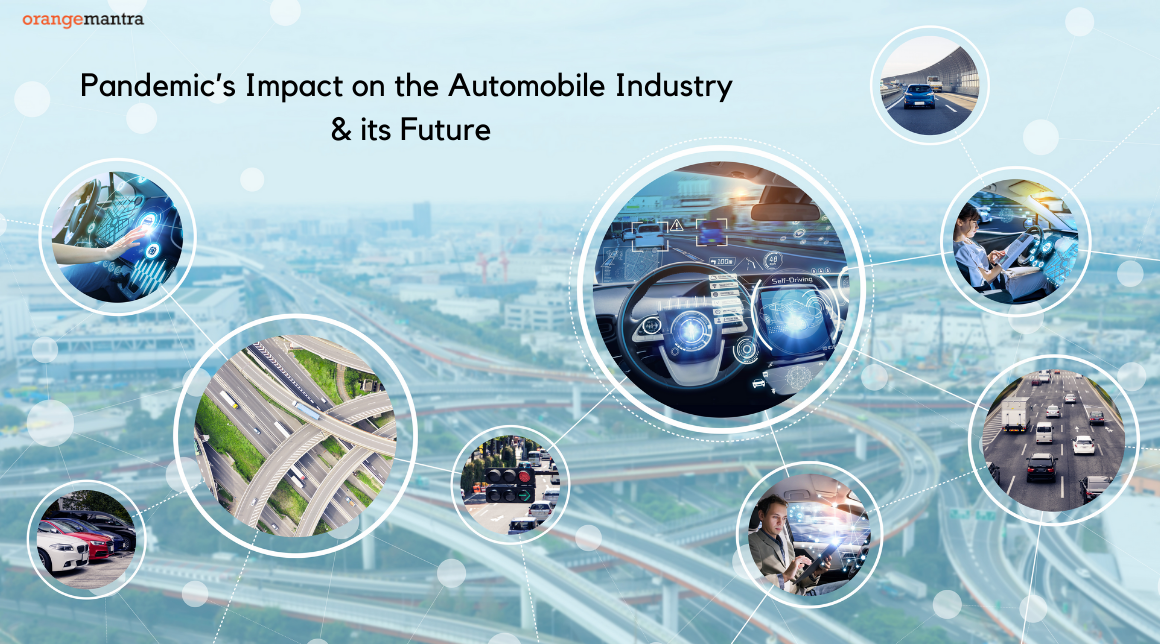Automobile production worldwide was brought to a standstill during the peak of the pandemic. Many countries are now gradually reopening economic activities, including auto production. But the challenges for the automobile industry are far from over. However, there are glimmers of hope. The industry is seeing some unprecedented transformation in terms of technology. In this blog post, we talk about the current challenges faced by the automotive industry due to the pandemic. We’ll also explore the transformation being seen by the industry and future opportunities.
The industry faces both economic and psychological challenges when it comes to automobile sales. The adverse effects of the virus outbreak have directly affected automobile sales and production. For many important automobile markets, the crisis is becoming a full-blown recession. The extremely sensitive supply chains of the industry have been disrupted like never before. From car manufacturing materials to automobile software solutions, everything has faced the heat of the disruption.
Major Impacts of the Pandemic on Automotive Industry
Several analysts and consultancy firms have predicted dire economic fallout due to the coronavirus pandemic. The adverse effects of the public health crisis are supposed to endure until at least 2022, according to most of the forecasts. The automobile sector is already one of the hardest-hit industries. We will know the precise impact and fallout in the coming weeks and months.
The automotive industry revolves around its complex supply chain. Like so many other things during this outbreak, the automobile supply chain was devastated. As automobile factories were shut worldwide to follow social distancing measures, the supply chain was broken like never. Countries like China have started to resume auto production in factories. But it will take a while for assembly lines line get back to their normal production.
Unprecedented Changes, New Opportunities
The automobile industry was reeling under challenges even before the pandemic hit. And then the worst happened: factories got closed, car dealers saw a complete stagnation of sales, and consumers were reluctant to buy vehicles.
Factory closures triggered substantial economic impact worldwide. With manufacturing plants becoming completely unproductive, it has become a matter of survival for many automobile companies Governments around the world are helping automakers with economic stimulus packages. While this may solve the problem to some extent, companies now need to take bold measures.
Early Dominance of Electric Vehicles?
Electric vehicles have remained a surprising segment for the industry during the lockdown. Sales of EVs have been resilient and even encouraging in some places. Electric cars saw a significant rise in sales in Europe as traditional car sales declined dramatically.
However, the impact of the lockdown caught up with electric cars too later during the lockdown. With forecasts of strong sales of EVs, EV charging solutions are already popping up rapidly across markets. However, automobile manufacturers may not like to scale up EV production for now. They are more likely to focus on high-end vehicles and SUVs that bring higher profits.
Digital Transformation as a Survival Tool
The bright side of this pandemic is the quick transformation the auto industry is experiencing during the pandemic. For example, a growing number of car dealers are selling vehicles online. Before the virus outbreak, consumers had virtually no option to buy a car online. But the lockdown has made it possible. For instance, companies like Tesla and Carvana are already offering online sales in the U.S.
Tesla customers can even choose and customize vehicles before buying them. Then the buyers get financing and pay for the cars on the company’s main website. Carvana, too, is offering similar options. Buyers can ship cars to them using online platforms. The digital boom has also prompted a surge in demands for products like connected car solutions and driving assistance software.
While traditional car dealers face growing problems, the ones having a digital infrastructure are sailing cautiously. It is also disrupting the automobile pricing model. Usually, carmakers rely on discounts and incentives to change prices frequently. Dealers accept these discounts partly because other dealers in the area are competing. But online selling breaks that chain. Online selling could be a win-win for dealers and car buyers.
Conclusion
The pandemic has brought unforeseen and unprecedented changes to the automotive industry. Most changes are damaging. But some have a brighter side, especially for the future. This crisis will not just upgrade the tech infrastructure of automakers and dealers worldwide but will also prepare them for future disasters. Digital transformation, for instance, has already enabled businesses to reduce disruptions caused by such crises.
At OrangeMantra, we have worked closely with many automakers, dealers, and equipment manufacturers. With our decades of experience, we cater to the traditional companies and emerging start-ups alike. Whether its factory automation or connected car solutions, you can count on us for everything tech.
FAQs

Q. What is IoT in the automotive industry?
IoT in the automotive industry enables systems to create new applications and solutions which can make vehicles smarter. IoT also makes vehicles safer, more efficient, and easier to drive and maintain.
Q. How does telematics work?
The Telematics system is enabled by a hardware device and a software solution. The system is installed into the vehicle to get real-time data. Telematics can be applied for real-time vehicle tracking, vehicle theft protection, predictive maintenance, etc.
Q. How do connected cars work?
Connected cars are equipped with the Internet (often via IoT). This allows the car to share internet access with other devices both inside as well as outside the vehicle. Connected vehicles have an array of advantages over traditional cars. These vehicles are smarter, safer, and provides real-time data.






















